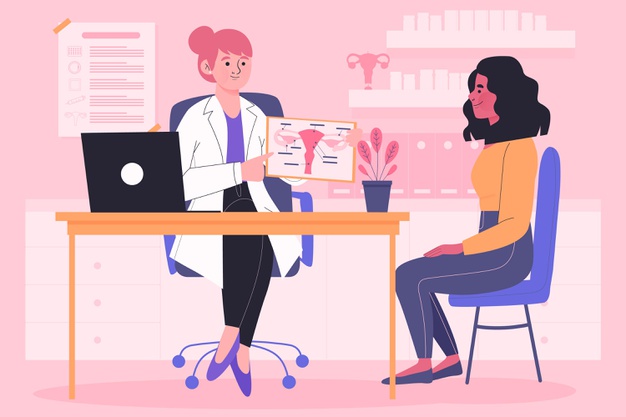Polycystic Ovary (PCO)
Definition:
It is a hormonal disorder common during women reproductive age. The ovaries develop multiple small follicles that effect the releasing of eggs. It affects 5 to 8% of women.
what is the difference between Polycystic Ovary Syndrome (PCO) and Ovarian Cyst?
PCOS differs in size and the number of follicles. The size of follicles can reach 8 mm and many in numbers. On the other hand, Ovarian Cysts might be functional, malignant or benign tumors or ovarian endometriosis. And in theses cases, the cysts could be 1 to 2 in numbers and more than 3 cm in size.
Symptoms:
– Irregular period or no period.
– Excess hair in upper lip, chin, tummy and chest.
– Weight gain.
– Acne or oily skin.
– Hair loss from the head.
– Difficulty in getting pregnant.
Causes of PCO:
The actual cause behind PCOS is not determined but it has been noticed that women with PCO have excess male hormones like Testosterone. Also, ovulation occurs monthly but women with PCO do not experience regular ovulation.
Ladies with PCO have higher probabilities of:
– Infertility.
– Miscarriage or preterm delivery.
– High blood pressure.
– High blood sugar.
– High level of cholesterol or triglyceride resulting to cardiovascular diseases.
– Depression and anxiety.
– Gestational diabetes.
– High blood pressure during pregnancy.
– Sleep apnea.
Diagnosis:
There is no specific test to diagnose PCO but it can be diagnosed by two out of three of the following:
– Irregular ovulation and irregular period.
– Symptoms of excess level of male hormones like excessive facial hair and acne, or by blood test.
– By ultrasound.
Lab tests can include:
– Pregnancy test in case of missed period.
– Blood test for male hormones level, Thyroid hormones and hormones responsible of regulating period.
– Blood test to check cholesterol, triglyceride level.
– Blood test for sugar level in blood.
Treatment:
By treating symptoms:
- For irregular period:
A. Birth control pills to regulate period and treating excessive hair.
B. Progestin taken monthly, and it helps also in lowering the chance of getting uterine cancer.
- For excessive hair:
A. Laser treatment.
B. Anti androgen medication for both excess hair and acne.
- Medication to improve insulin resistance and lower insulin level like Metformin. It also helps in regulating periods in 50% of the cases. And if the lady has diabetes, it helps in regulating insulin level in blood.
- Medication for ovulation like anti estrogen.
- Other solutions:
Changing life style by losing weight with exercising and following a healthy diet.
- Surgery by ovarian drilling if other methods fail.
Pregnancy Delay:
Most of the women with PCO can increase their chance of getting pregnant by losing weight, regulating their periods, and in some cases with fertility treatments or, in rare cases, by ovarian drilling.



